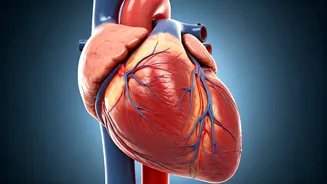Embrace Regular Exercise
The first essential tip from the experienced New York cardiologist revolves around incorporating regular physical activity into your lifestyle. This doesn't
mean you need to dedicate hours at the gym; rather, consistent movement is key. Activities like brisk walking, cycling, or swimming for at least 30 minutes most days of the week can significantly benefit your cardiovascular health, improve mood, and boost overall longevity. Regular exercise assists in maintaining a healthy weight, strengthens bones and muscles, and decreases the risk of chronic diseases such as heart disease and diabetes. Start gradually and find activities you enjoy to make it a sustainable habit.
Nourish with Balanced Diet
Next on the list is focusing on your diet. The cardiologist emphasizes the significance of consuming a balanced diet rich in fruits, vegetables, whole grains, and lean proteins. This means limiting processed foods, sugary drinks, and excessive saturated fats. Prioritizing nutrient-dense foods gives your body the essential vitamins, minerals, and antioxidants it needs to function optimally. Incorporating a variety of colorful fruits and vegetables ensures you receive a wide range of vital nutrients. Paying attention to portion sizes and being mindful of your food choices will contribute greatly to your long-term health and well-being. A balanced diet supports healthy weight management, reduces inflammation, and lowers the risk of various age-related diseases.
Prioritize Quality Sleep
Getting adequate sleep is another cornerstone of a longer life, according to the experienced New York cardiologist. Aim for 7-9 hours of quality sleep each night. Sleep is essential for the body's repair and recovery processes. During sleep, the body resets and strengthens the immune system. Lack of sleep can weaken the immune system, increase the risk of chronic diseases, and negatively affect cognitive functions. Consistent sleep helps regulate hormones, control appetite, and support both physical and mental well-being. Establish a regular sleep schedule, create a relaxing bedtime routine, and make sure your sleep environment is comfortable to improve the quality of your sleep.
Manage Stress Effectively
The cardiologist advises actively managing stress, as chronic stress can have detrimental effects on health. Find healthy ways to cope with stress, such as practicing meditation, deep breathing exercises, yoga, or spending time in nature. Engaging in hobbies, connecting with friends and family, and seeking professional help if needed can also be beneficial. Stress can significantly impact your cardiovascular system, immune system, and mental well-being. By minimizing stress through relaxation techniques and a supportive network, you can significantly enhance your health and decrease your risk of age-related illnesses. Be aware of your stress triggers and develop coping strategies that suit your lifestyle.
Stay Hydrated Daily
Adequate hydration is a crucial factor for overall health and is often underestimated. The cardiologist strongly recommends drinking sufficient water throughout the day. Water helps maintain numerous bodily functions, including regulating body temperature, transporting nutrients, and removing waste. Dehydration can lead to fatigue, headaches, and decreased cognitive function. Aim to drink water consistently, even when you don't feel thirsty, especially during exercise or in warmer climates. The amount of water needed varies depending on individual factors like activity level, climate, and overall health. Carry a water bottle with you and sip on it throughout the day to stay well-hydrated and support optimal health.
Maintain Healthy Weight
Maintaining a healthy weight is another key recommendation from the experienced doctor. Obesity and being overweight increase the risk of many health problems, including heart disease, diabetes, and certain cancers. By combining regular exercise with a balanced diet, you can maintain a healthy weight. This can include monitoring your calorie intake, making smart food choices, and controlling portion sizes. Regular monitoring and adjusting your lifestyle as needed will help keep your weight in a healthy range. Maintaining a healthy weight not only enhances physical health but also improves your mental and emotional well-being, providing more energy and better self-esteem.
Regular Health Checkups
Regular medical checkups and screenings are vital, as highlighted by the cardiologist. These routine appointments are essential for early detection and prevention of diseases. Regular check-ups allow doctors to monitor your health, screen for potential problems, and provide timely interventions. Depending on your age, health history, and risk factors, your doctor might recommend various tests like blood pressure checks, cholesterol screenings, and cancer screenings. Early detection of health issues increases the chances of successful treatment. Ensure you stay up-to-date with recommended screenings and follow your doctor's advice regarding lifestyle changes and medications.
Limit Alcohol Intake
Consuming alcohol in moderation is recommended. Excessive alcohol consumption is linked to multiple health problems, including liver disease, heart problems, and certain cancers. If you choose to drink alcohol, the cardiologist suggests limiting your intake to one drink per day for women and up to two drinks per day for men. One drink is typically defined as 12 ounces of beer, 5 ounces of wine, or 1.5 ounces of liquor. Being mindful of your alcohol consumption can greatly improve your overall health and lower the risk of many alcohol-related health issues. Always consider your health status and any medications you are taking when determining the appropriate amount of alcohol intake.
Avoid Tobacco Products
Avoiding tobacco products is a non-negotiable recommendation. Tobacco use is a primary cause of numerous diseases, including lung cancer, heart disease, and stroke. Regardless of the form, whether it’s smoking cigarettes, cigars, or using smokeless tobacco, the harmful chemicals can damage nearly every organ in the body. Quitting tobacco use, regardless of how long you've been using it, will positively impact your health almost immediately. Various resources and support systems are available to help you quit, including counseling, medication, and support groups. Seeking assistance and committing to this significant change can considerably boost your health and extend your life.
Cultivate Social Connections
The tenth tip focuses on the importance of maintaining strong social connections. Having a solid network of friends, family, and community support can greatly enhance mental and physical well-being. Strong social bonds provide a sense of belonging, reduce feelings of loneliness, and offer emotional support during challenging times. Regular interaction with others can improve cognitive function, lower stress levels, and boost overall happiness. Invest time in nurturing your relationships, joining social groups, or volunteering, which are all great ways to strengthen your connections. Social engagement is a powerful tool for a longer and healthier life.




















